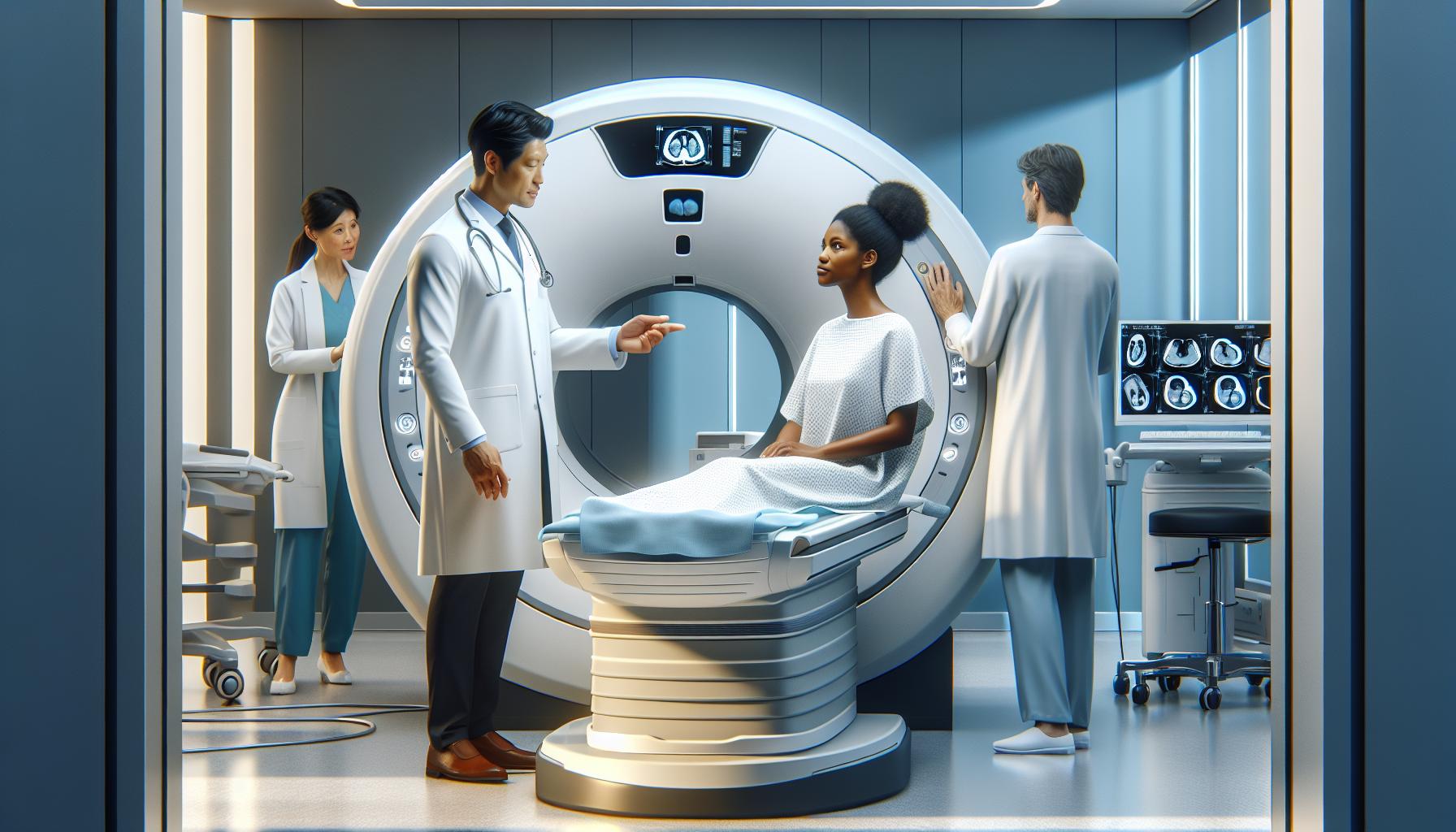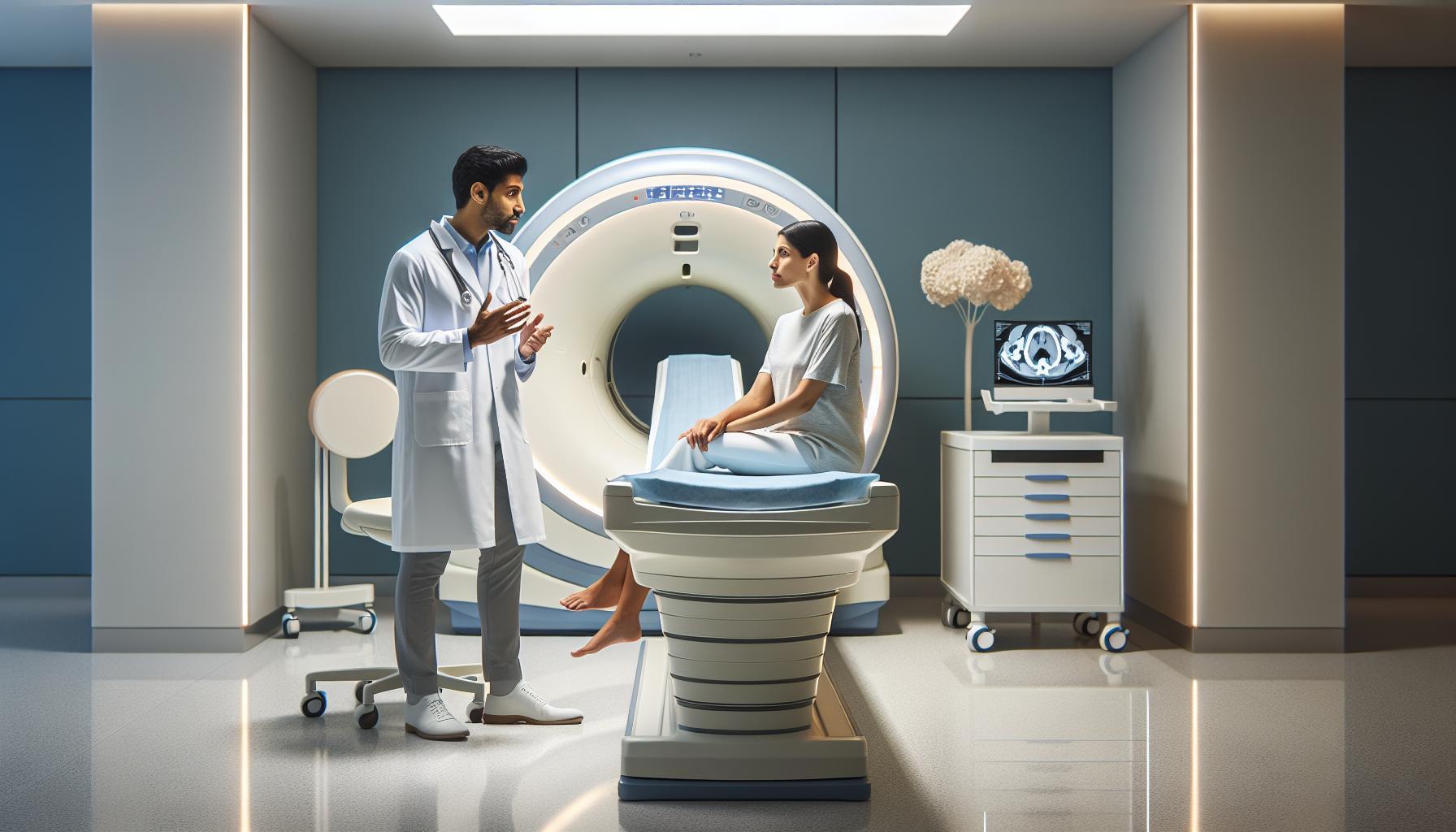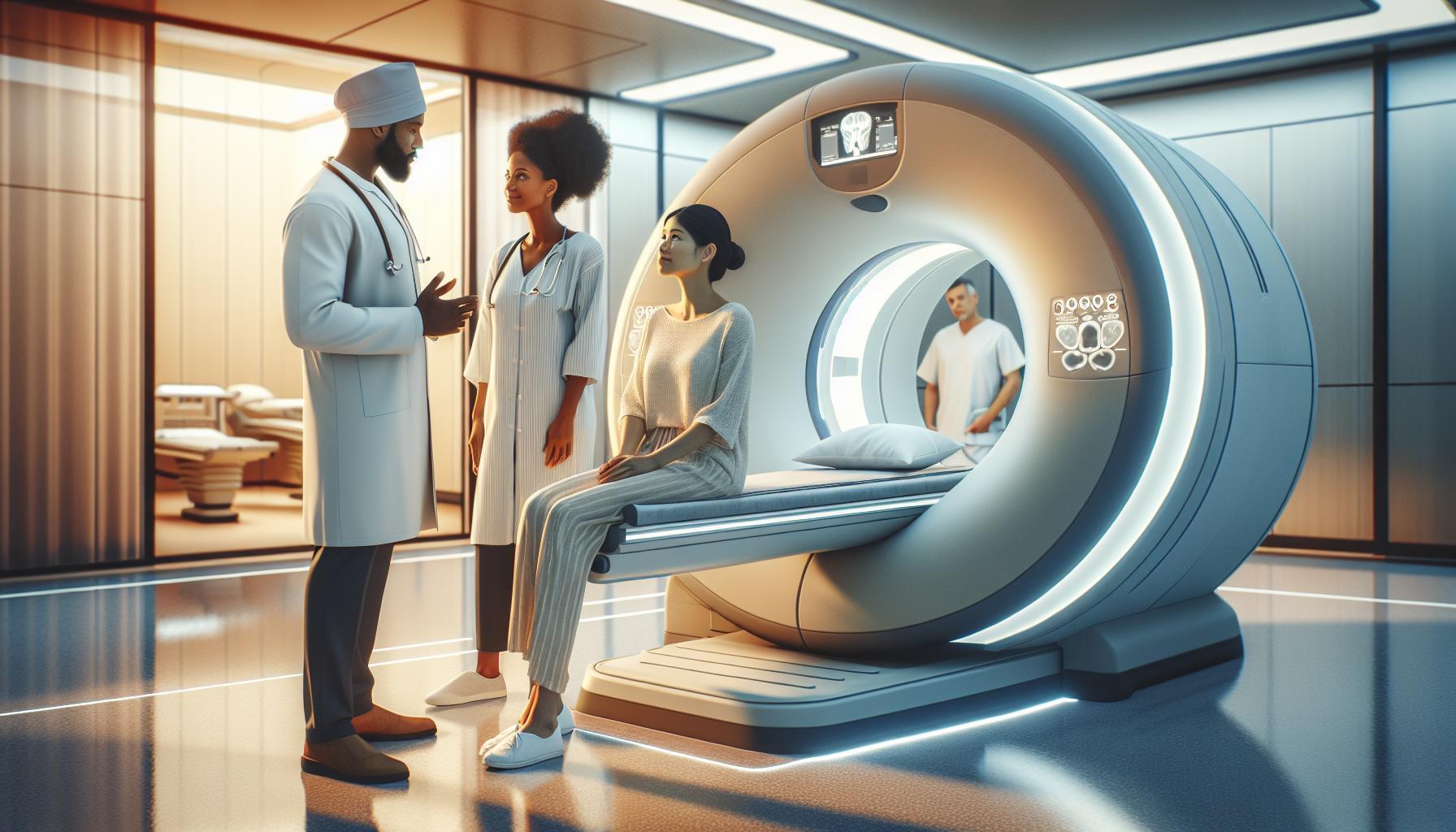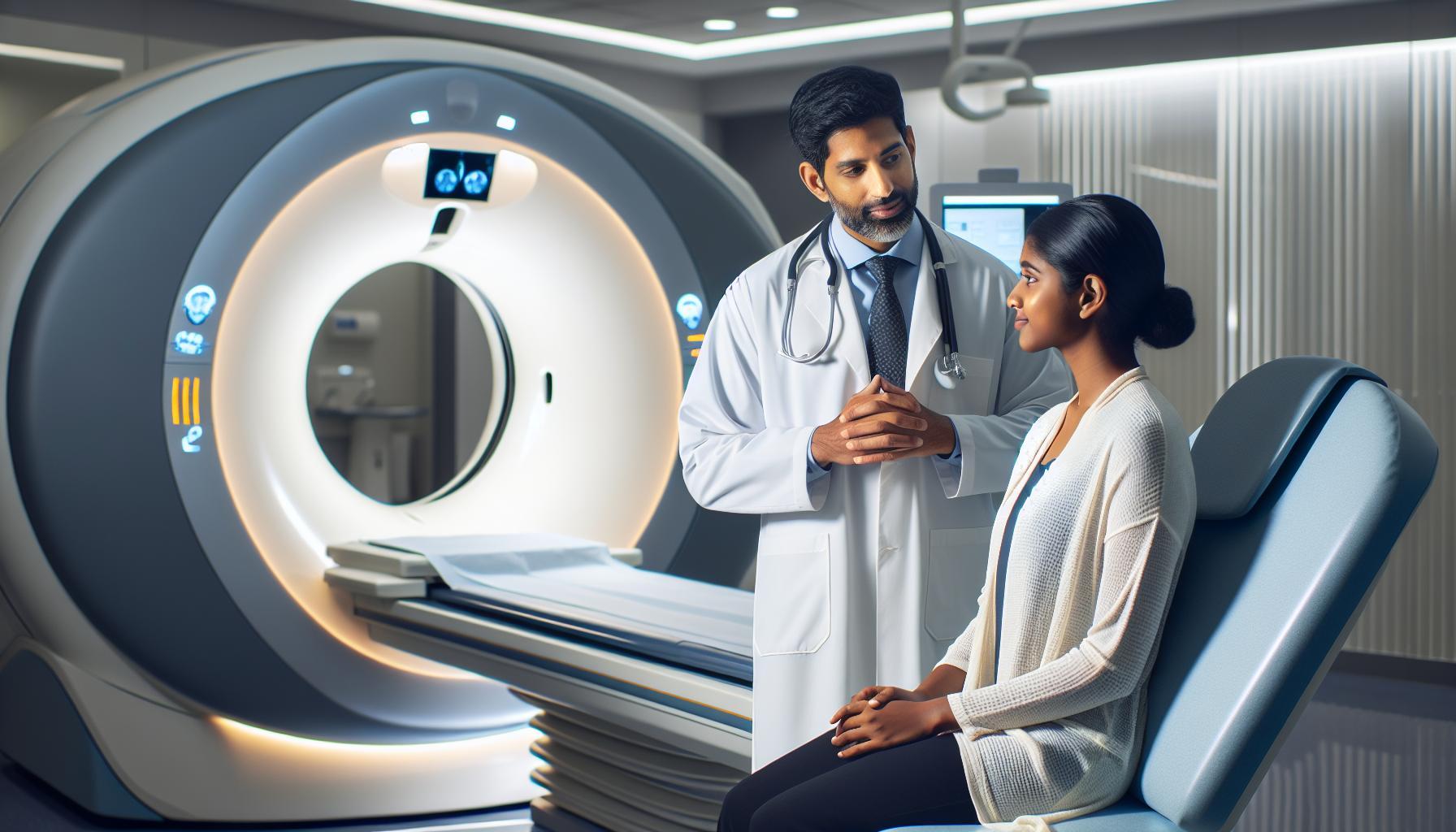Undergoing a CT scan can be a pivotal moment in your healthcare journey, especially when understanding the time commitment involved. Typically, a CT scan is a relatively quick procedure, often lasting just 10 to 30 minutes, depending on the specific area being scanned and the complexity of the imaging needed. Knowing how long it takes can alleviate some anxiety and help you plan for your visit.
For many, the anticipation of medical imaging can lead to uncertainty and questions about the process. You may wonder what to expect, how it all works, and how to prepare yourself. This article will guide you through everything you need to know about CT scans-removing the guesswork and empowering you with knowledge. By the end, you’ll have a clearer perspective, so you can approach your appointment with confidence and peace of mind.
How Long Does a CT Scan Typically Take?
One of the remarkable aspects of modern medical imaging is the efficiency with which CT scans can be conducted. Typically, a CT scan takes anywhere from 10 to 30 minutes. This duration may vary slightly depending on the specific type of scan and the area being examined. For example, a routine scan of the chest or abdomen usually falls on the shorter end of that spectrum, whereas more complex scans, requiring multiple angles or contrast materials, may take a little longer.
During this time, you may be asked to hold your breath briefly as the imaging equipment captures detailed cross-sectional images of your body. Each image is taken in a matter of seconds, but the overall time includes preparation, positioning, and any necessary adjustments to ensure high-quality results. It’s important to arrive early to your appointment for any preliminary paperwork and to discuss any concerns with the radiologic technologist.
Patients often report feelings of anxiety before their scan; however, understanding the typical timeframe can help ease these worries. If a contrast dye injection is part of the procedure, that process may require additional time for monitoring. Ultimately, being informed and prepared can make the experience smoother and more comfortable, allowing healthcare providers to obtain the best diagnostic images efficiently.
Understanding the CT Scan Process
Understanding the intricacies of a CT scan can significantly alleviate any apprehensions you may feel about the procedure. Computerized Tomography (CT) scans are remarkable imaging tools that play a crucial role in diagnosing various medical conditions. They utilize advanced X-ray technology to create detailed cross-sectional images of the body. One of the pivotal aspects of this process is that it typically takes a brief amount of time, usually within the range of 10 to 30 minutes. However, this time frame can fluctuate based on factors like the complexity of the scan and whether contrast material is used.
The breakdown of the CT scan process starts before you even step into the imaging room. Preparing for a CT scan involves ensuring you are well-informed about what to expect, which can ease any anxiety. Upon arrival, staff will guide you through a series of steps, including filling out any necessary forms and discussing your medical history. If your scan requires a contrast dye to enhance certain images, the staff will explain the purpose and process involved, which may include having the dye injected before the scan.
During the actual scan, you’ll be positioned on a comfortable table that slides into the CT scanner. It’s common for patients to be asked to hold their breath for a few seconds while the machine captures images, as this can help minimize motion blur and enhance the quality of the images. The entire operation is generally swift: while each individual image is taken in a matter of seconds, the complete scan time includes preparation, positioning, and subsequent checks.
Understanding that a CT scan is a straightforward and relatively quick procedure can help patients approach it with a sense of calm. Communication with the healthcare team is key; feel free to voice any questions or concerns prior to the scan so that you can feel more at ease during this important diagnostic process. Remember, knowledge and preparation are your best allies in making this experience smooth and effective.
Step-by-Step Guide to Preparing for Your CT Scan
Preparing for a CT scan can feel daunting, but understanding the steps involved can greatly ease your anxiety. With these simple preparations, you can enter the imaging room with confidence and knowledge. First and foremost, make sure to keep open lines of communication with your healthcare team. Discuss any medications you are taking, allergies, and any previous reactions to contrast materials if applicable. This crucial information helps ensure your safety throughout the process.
One of the significant aspects of preparation is understanding whether your CT scan requires the use of a contrast agent, commonly referred to as “dye.” If contrast is necessary, your healthcare provider will give you specific instructions regarding fasting-usually, you may need to refrain from eating for several hours prior to the procedure. This fasting helps enhance the quality of the images obtained during the scan. Additionally, staying well-hydrated is important if you are not restricted from drinking water, as it helps flush the contrast dye out of your system post-scan.
When it comes to attire, wear comfortable, loose-fitting clothing without metal fasteners, as metal can interfere with imaging quality. You might be asked to change into a medical gown depending on the location of the scan. Arriving early allows you time to complete any necessary paperwork and helps reduce the last-minute rush; this can also provide time to ask any lingering questions.
Finally, bringing along a supportive friend or family member can be comforting, especially if you’re feeling anxious. They can help keep your spirits up and assist you with any logistical concerns, such as transportation after the test if you are receiving contrast dye, which may temporarily affect your body. Engaging in these preparatory steps not only prepares you physically for the scan but also helps soothe emotional apprehensions, making the experience smoother and more manageable.
What Happens During a CT Scan?
During a CT scan, often thought of as a quick and straightforward process, there’s a fascinating interplay of technology and patient care that unfolds. Upon entering the imaging room, you’ll be greeted by a calm environment that aims to alleviate any anxiety you may feel. It’s reassuring to know that the entire procedure typically takes about 10 to 30 minutes, but this can vary based on the type of scan being performed and any specific preparations you’ve made.
Once you’re comfortably positioned on the moving examination table, the technologist will place you in the scanner, which resembles a large doughnut. As the table glides through the opening, X-ray beams are emitted from circular rings around the scanner that capture detailed images of your body’s internal structures. It’s important to remain still during this part of the process, as movement can blur the images. You may be asked to hold your breath briefly to ensure the best quality pictures are taken.
If your scan requires a contrast agent, you may feel a warm sensation as the dye flows through your veins. This contrast helps highlight specific areas of interest and allows for clearer imaging. Throughout the scan, the technologist will monitor you from another room via a video screen, ensuring that your comfort and safety are prioritized. You’ll likely hear whirring sounds and may feel the table adjusting, but there’s no need for alarm-this is all part of the process.
Once the scan is complete, the table will slide out, and you will be assisted in getting up. There’s no recovery time needed, so you can typically go about your day immediately afterward. Remember, if you have any lingering questions or concerns about the scan’s results or process, don’t hesitate to reach out to your healthcare provider for personalized advice and reassurance. The goal is to ensure you feel informed and supported every step of the way.
Post-Procedure: What to Expect After a CT Scan
After completing your CT scan, an experience often accompanied by a sense of relief, you’ll find that there are a few steps and considerations that follow. Typically, there is no recovery time needed, meaning you can go about your day as soon as the procedure is over. However, it’s natural to have questions or feelings of uncertainty about what comes next.
First and foremost, if you received a contrast agent during your scan, you might experience mild side effects, such as a warm sensation, a slightly metallic taste in your mouth, or even a brief feeling of nausea. These sensations are usually temporary and should subside quickly. It’s important to stay hydrated after receiving contrast dye to help flush it out of your system, so consider drinking extra water in the hours following your scan.
Understanding Your Results
The next important phase involves the interpretation of the images. Radiologists will analyze the scans and prepare a report, which will typically be sent to your healthcare provider within a few days. Depending on the complexity of the scan and the findings, this time frame can vary. Your physician will discuss the results with you during a follow-up appointment. If your results are urgent, you might hear back sooner.
When to Seek Help
While most patients feel perfectly fine after a CT scan, it’s crucial to be aware of any unusual symptoms that may arise, especially if contrast was used. Contact your healthcare provider immediately if you experience severe headaches, difficulty breathing, swelling, or other concerning symptoms. These could indicate an allergic reaction or other complications that need prompt attention.
In summary, while the journey of a CT scan may evoke anxiety, understanding the process that follows can empower you and alleviate your concerns. Keep the lines of communication open with your healthcare team; they are there to support you through your imaging experience and address any questions or worries you might have as you await your results.
Factors That Influence CT Scan Duration
The timing of a CT scan can vary significantly based on several factors, and understanding these can help set your expectations. Generally, a CT scan can take anywhere from a few minutes to half an hour, but factors like the scan type, scheduling, and patient preparation can influence this duration.
One primary factor is the type of scan being performed. Routine scans, such as a CT of the abdomen or chest, may take less time compared to more complex scans requiring additional imaging or specialized protocols. For example, scans that involve contrast material usually require extra time for the contrast to be administered, and for the radiology technician to ensure that it is circulating properly before taking the images.
Additionally, the preparation beforehand can also impact the scanning process itself. If patients need to pause for specific instructions-like holding their breath during imaging or adjusting their position-this can add extra minutes. Moreover, if patients are anxious or have difficulty remaining still due to discomfort, this might necessitate more time for reassurance and positioning.
Lastly, the efficiency of the imaging center can play a crucial role. Well-equipped facilities with competent staff can often perform scans more quickly. However, peak times may lead to delays if the equipment is being shared with other patients, presenting another consideration in determining how long you might need to spend at the facility on the day of your scan.
In summary, while the duration of a CT scan can generally be brief, numerous factors-from the type of scan to personal circumstances and facility operations-can influence how long the entire process takes. Preparing accordingly and communicating with your healthcare team can help ensure a smoother experience.
Comparing CT Scans to Other Imaging Techniques
The rapid advancement of medical imaging technologies presents a multitude of options for diagnosing health conditions, with CT scans leading the way in speed and effectiveness. In comparison to other imaging techniques such as MRI and X-rays, CT scans offer unique advantages and considerations. Understanding these differences can greatly influence your choice when it comes to diagnostic imaging.
CT scans are notably faster than MRI scans, typically taking just a few minutes instead of the 30 to 60 minutes often required for MRIs. This speed can be critical in emergency situations where timely diagnosis is essential. For patients who may experience anxiety or discomfort from being in an enclosed space, CT scans are often more tolerable due to their brief duration and open design. Additionally, while both CT and X-ray imaging utilize radiation, CT scans provide far more detailed images, allowing for a more comprehensive assessment of internal structures.
However, the choice between imaging types often boils down to the specific medical need. CT scans excel at visualizing bone injuries, locating tumors, and identifying internal bleeding, making them invaluable tools in emergency settings. Conversely, MRI is preferable for imaging soft tissues like the brain or spinal cord, providing clearer images without ionizing radiation. Each modality has its own set of preparation protocols and potential risks, so discussing your options with your healthcare provider will ensure the best approach tailored to your condition.
Ultimately, being informed about how CT scans compare to other imaging techniques can empower you to engage actively in your healthcare decisions. If you have concerns about the imaging process, understanding each option’s implications and speaking with your medical team can provide reassurance and clarity, paving the way for a smooth imaging experience.
Costs Associated with CT Scans: What You Should Know
The cost of a CT scan can vary significantly depending on various factors, including the location of the imaging facility, whether the procedure is performed in a hospital or an outpatient center, and your insurance coverage. On average, the cost of a CT scan in the United States can range anywhere from $300 to $3,000. For patients without insurance, the out-of-pocket costs can certainly be daunting, but understanding the factors that contribute to these charges can help in navigating them more effectively.
Key Factors Influencing Costs
- Location: Prices in urban areas or large hospitals tend to be higher due to operational costs, while smaller clinics or rural hospitals may offer lower rates.
- Type of CT Scan: Specific scans like a CT angiography or those requiring contrast materials may cost more than a standard CT scan.
- Insurance Coverage: Major insurance plans often cover a significant portion of the scan fee, but copays and deductibles vary. It’s advisable to verify with your provider.
- Facility Fees: Hospitals may include facility fees in addition to the radiologist’s interpretation fee, leading to higher total costs.
Many facilities offer payment plans or financial assistance for those who may struggle to afford these services. Additionally, it can be beneficial to inquire about any discounts or bundled payment options, especially if multiple scans are needed. Before proceeding with a CT scan, discussing the costs with both your healthcare provider and the imaging center can clarify potential expenses and help avoid surprises.
Remember, if you ever feel uncertain or anxious about the financial aspects of your healthcare, it’s essential to reach out to your insurance provider and the imaging facility for transparent information. Your health is a priority, and being informed can empower you to make the best choices regarding your medical care.
Benefits and Risks of CT Scans Explained
CT scans are invaluable tools in modern medicine, allowing for rapid and detailed imaging of the body. While they can provide critical diagnostic information, understanding both the benefits and risks associated with this imaging technique can empower patients to make informed healthcare decisions.
One of the primary advantages of CT scans is their ability to produce high-resolution images of internal organs, bones, and soft tissues in a matter of minutes. This speed is essential in emergency situations where time is of the essence, such as detecting internal injuries or conditions like stroke. Additionally, CT scans can offer more detail than traditional X-rays, making them crucial for diagnosing complex conditions, guiding biopsies, and evaluating treatment efficacy. They can also help in planning surgical procedures, giving healthcare providers clear insights into a patient’s anatomy.
However, alongside these benefits, there are inherent risks to consider. The most notable concern is exposure to ionizing radiation, which, while relatively low in a single scan, can accumulate over time, especially for patients requiring multiple scans. This risk is particularly pertinent for certain populations, such as children and pregnant women, where the potential effects of radiation may be more pronounced. Healthcare providers typically weigh the necessity of the scan against these risks. Patients are encouraged to have open discussions with their physicians about the need for imaging, potential alternatives, and ways to minimize radiation exposure, such as using lead shields or opting for non-radiation-based imaging when appropriate.
Ultimately, the decision to proceed with a CT scan should be made collaboratively between the patient and healthcare provider, considering both the diagnostic benefits and the associated risks. By being informed and asking the right questions, patients can better navigate their healthcare journey and make choices that align with their needs and safety.
Decoding Your CT Scan Results
After undergoing a CT scan, many patients find themselves eager to understand the results and how they relate to their health. It’s common to feel a mix of curiosity and anxiety as you await the interpretation of the images taken. The first step in is to remember that the radiologist, a specialist trained in interpreting imaging studies, will carefully analyze the scans for any abnormalities. They will generate a detailed report highlighting their findings and send it to your primary care physician or the referring doctor.
Once your healthcare provider receives the report, they will schedule a follow-up appointment with you to discuss the results. This discussion is crucial as it allows you to ask questions and understand what the findings mean in the context of your overall health. Here are some key components to consider when reviewing your CT scan results with your physician:
- Understanding Terminology: Medical jargon can be intimidating. Don’t hesitate to ask for clarification on terms that are unfamiliar or confusing.
- The Role of Imaging: Remember, a CT scan is just one piece of the diagnostic puzzle. Your doctor will consider these results alongside your symptoms, medical history, and possibly other tests.
- Next Steps: Depending on the results, your doctor might suggest further imaging, additional tests, or a specific treatment plan. Discussing these options with your provider can help alleviate concerns about your health.
If the scan shows a potential issue, it’s natural to feel anxious or concerned. However, it’s important to approach these findings with an open mind and seek comprehensive explanations from your healthcare team. They are there to guide you through any necessary steps and to ensure you understand your health better. Engaging actively in this conversation can empower you to make informed decisions regarding your health management. Remember, every patient’s situation is unique, and personalized guidance from your healthcare provider is essential to navigating the next steps effectively.
Frequently Asked Questions About CT Scans
In the world of medical imaging, CT scans are a frequently used diagnostic tool, and many patients often have questions about them. Addressing these concerns can greatly alleviate anxiety and promote understanding of the CT scan process.
One common question is about the duration of a CT scan. Typically, a single scan can take anywhere from 10 to 30 minutes depending on various factors, including the type of scan being performed and the specific area of the body being examined. However, the actual scanning process itself is usually quite fast, often lasting only a few seconds. It’s important to note that additional time may be needed for preparation, such as positioning and installing IVs for contrast material if required.
Another frequent topic is the safety of CT scans. Many patients worry about radiation exposure. While it’s true that CT scans involve a higher dose of radiation than traditional X-rays, the risks are mitigated by the benefits they provide in accurate diagnosis and treatment planning. It’s advisable to discuss these concerns with your healthcare provider, who can better explain the necessity of the scan and the safety measures in place to minimize risks.
Lastly, understanding the potential results of a CT scan can be a significant source of concern. Patients often wonder how soon they will know the outcomes. Generally, the radiologist analyzes the images promptly, and your doctor will discuss the results with you within a few days. This timeframe helps ensure that both you and your healthcare team can make informed decisions based on your diagnosis.
By staying informed and having open conversations with your healthcare providers, you can navigate the CT scan process with greater confidence and peace of mind. Always remember that your health team is there to support you and answer any questions you may have before, during, and after the procedure.
FAQ
Q: How long does a CT scan take to complete?
A: A CT scan typically takes 10 to 30 minutes, depending on the specific area being scanned and the type of scan being performed. However, the entire process may take longer if you include preparation and post-scan discussions with the healthcare team.
Q: What should I expect during a CT scan?
A: During a CT scan, you’ll lie on a table that slides into the scanner. You may need to hold your breath briefly while images are taken. The procedure is painless, but you may hear whirring noises from the machine.
Q: Are there any side effects after a CT scan?
A: Generally, there are no side effects after a CT scan. However, if a contrast dye is used, some patients may experience mild reactions, such as a warm sensation or slight discomfort at the injection site.
Q: Can I eat before a CT scan?
A: It depends on the type of CT scan. For scans involving contrast dyes, you may be advised to avoid solid foods for several hours before the procedure. Always follow your healthcare provider’s specific instructions.
Q: How can I prepare for a CT scan?
A: Preparation for a CT scan may include drinking plenty of fluids and avoiding certain medications or foods. Always consult your healthcare provider for personalized preparation advice based on your scan type.
Q: What happens if I feel anxious during a CT scan?
A: If you’re feeling anxious, inform your healthcare team. They can provide support and may offer sedation options to help you relax during the scan.
Q: Is a CT scan safe?
A: Yes, a CT scan is generally considered safe, but it involves exposure to radiation. The benefits typically outweigh the risks, especially when used to diagnose medical conditions. Always discuss any concerns with your healthcare provider.
Q: How long does it take to get CT scan results?
A: CT scan results are usually available within hours to a few days, depending on the facility and the urgency of your condition. Your doctor will discuss the results with you during a follow-up appointment.
Wrapping Up
As you prepare for your upcoming CT scan, remember that understanding the process can significantly ease your concerns. You’ve learned how long a CT scan typically takes and what to expect, ensuring a smoother experience. If further questions arise, don’t hesitate to explore our comprehensive guides on preparing for medical imaging or understanding the costs associated with scans.
Your health is paramount, so consider scheduling a consultation to discuss personalized imaging needs or sign up for our newsletter to receive the latest updates and insights directly to your inbox. Empower yourself with knowledge and take charge of your health journey today! Feel free to share your thoughts or experiences in the comments below; your insights may help others facing similar situations. Let’s continue to support one another in navigating healthcare together!




